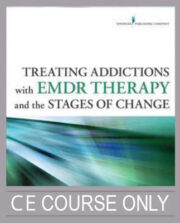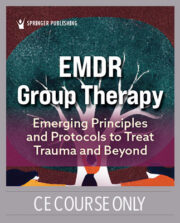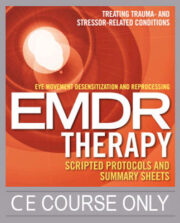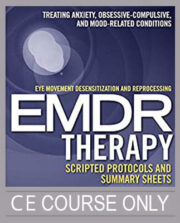An EMDR Therapy Primer: From Practicum to Practice – Barbara Hensley Book Study (12 Credit Hours)
$99.00
This Home Study Program offers an opportunity to earn 12 CE hours (EMDRIA, Psychologists, LCSW, LMFT, LMHC, LPC and other master’s level clinicians. Check with state licensing board to confirm acceptance of NBCC credits). The book itself (not included) is the educational content of this program. By passing the CE program quiz developed for this program, you will demonstrate that you have gained knowledge by reading this book.
The book is not included in the purchase of this CE program. To purchase a copy of the book, click HERE or HERE.
by Barbara J. Hensley, EdD, LPCC
book purchased separately
Barbara Hensley’s book, An EMDR Therapy Primer: From Practicum to Practice, is written as a primer and companion to Francine Shapiro’s EMDR texts. It is a step-by-step overview of the foundations of EMDR therapy presented in easily accessible, conversational language, and helps both new and experienced clinicians to maximize their preparation and skills in using EMDR safely, confidently, and effectively. By providing concise coverage of the AIP model and EMDR principles, protocols, and procedures, and by addressing the types of targets accessed during the EMDR process, the book expertly summarizes the eight phases of EMDR with myriad examples so core content can be easily grasped.
The third edition is fully revised to include case examples on treating specific populations and issues – transgender issues, military personnel, children, and disaster response. The author has ensured that all relevant new information on components of memory, precepts of EMDR therapy, and adaptive information processing has been fully integrated into the text, making this the most up-to-date book available on the foundations of EMDR therapy. An eBook is included with the purchase of the print edition.
(Click here to preview the book’s table of contents.)
 Barbara J. Hensley, EdD is a Clinical Counselor in Cincinnati, Ohio and a Board-Certified Diplomate for the American Academy of Experts in Traumatic Stress. She served on the EMDR International Association Board of Directors as President and Treasurer and has represented EMDRIA in Stockholm, Sweden, and Brussels, Belgium. She served eight years as a Board Member for the EMDR Research Foundation.
Barbara J. Hensley, EdD is a Clinical Counselor in Cincinnati, Ohio and a Board-Certified Diplomate for the American Academy of Experts in Traumatic Stress. She served on the EMDR International Association Board of Directors as President and Treasurer and has represented EMDRIA in Stockholm, Sweden, and Brussels, Belgium. She served eight years as a Board Member for the EMDR Research Foundation.
Dr. Hensley is an EMDRIA-Certified Therapist and Approved Consultant and Regional Coordinator for the Greater Cincinnati EMDR Regional Network. For the past twenty-three years, she has been a facilitator and logistician for the EMDR Institute trainings in Japan and throughout the United States and has served as a facilitator for Trauma Recovery (EMDR-HAP).
She is the creator of the Francine Shapiro Library, an online resource of EMDR research and writings. She is also the 2009 recipient of the distinguished Francine Shapiro Award for her extraordinary service and contributions to EMDR. Dr. Hensley is the co-founder of the Cincinnati Trauma Connection in Cincinnati, Ohio, an EMDR-based trauma center.
Learning objectives:
|
|
Key Features: * Like having a tutor in your pocket
|
|
WHAT’S AVAILABLE?
|
Instructions after purchase of book study program:
1. After completing your purchase, you will receive an email receipt verifying your purchase with a link to a quiz based upon the book’s content.
2. For your convenience, you will be provided a downloadable PDF version of the quiz to use while you read.
3. To earn your CE hours, you must answer the quiz questions online.
4. When you complete and pass the quiz, you will be issued a downloadable certificate for EMDRIA and NBCC approved Masters Level professional certificate with CE hours documented
EMDR International Association:
EMDR Advanced Training & Distance Learning, LLC is an EMDRIA Approved Credit Provider (#07002) and maintains responsibility for this program and its content in accordance with EMDRIA standards.
National Board for Certified Counselors:
EMDR Advanced Trainings & Distance Learning, LLC has been approved by NBCC as an Approved Continuing Education Provider, ACEP No. 6709. Programs that do not qualify for NBCC credit are clearly identified. EMDR Advanced Training and Distance Learning, LLC is solely responsible for all aspects of the program.
American Psychological Association:
Advanced Psychotherapy Trainings (APT) is approved by the American Psychological Association to sponsor continuing education for psychologists. APT maintains responsibility for this program and its content.


The book is not included in the purchase of this CE program. To purchase a copy of the book, click HERE or HERE.
Cancellation/Refund Policy: Requests for program purchase cancellation/refund must be in writing to info@emdradvancedtrainings.com no later than 2 weeks after registering for the program. Refunds will be 75% of purchase price. No refund will be given for requests made past this timeframe or for those programs for which the attendee has already obtained CE hours.
Note: you should receive an automatic confirmation email for your order. If you do not, please check your spam filter and/or tabs. If you still cannot find your receipt, please email info@emdradvancedtrainings.com.
Related products
-

Treating Addictions with EMDR Therapy and the Stages of Change, Abel and O’Brien Book Study (12 CE Hours)
$99.00 Sold By: EMDR Advanced Trainings & Distance Learning -

Reissue CE Program Certificate
$25.00 Sold By: EMDR Advanced Trainings & Distance Learning -

TREATING DISSOCIATIVE DISORDERS WITH EMDR: THE PROGRESSIVE APPROACH WITH DOLORES MOSQUERA – 6 CE HOURS (English and Español classes)
Sold By: EMDR Advanced Trainings & Distance Learning
Related Products
-

Group EMDR Therapy: Emerging Principals and Protocols to Treat Trauma and Beyond Book Study~~~Editors Regina Morrow Robinson and Safa Kemal Kaptan (12 CE Hours)
$99.00 Sold By: EMDR Advanced Trainings & Distance Learning -

Group EMDR Therapy: Emerging Principals and Protocols to Treat Trauma and Beyond Book Study CE Program Only~~~Editors Regina Morrow Robinson and Safa Kemal Kaptan (12 CE Hours) with NBCC blurb
$99.00 Sold By: EMDR Advanced Trainings & Distance Learning -

Treating Trauma- and Stressor-Related Conditions – Marilyn Luber Book Study (12 CE Hours)
$99.00 Sold By: Marilyn Luber -

Treating Somatic Illness and Medical Treatment Trauma with EMDR Therapy – 6 CE Hours – Hase
Sold By: EMDR Advanced Trainings & Distance Learning -

Treating Anxiety, Obsessive-Compulsive and Mood-Related Conditions – Marilyn Luber Book Study (12 CE Hours)
$99.00 Sold By: Marilyn Luber -

Global Summit – Breaking the Cycle of Violence: EMDR Interventions for Recovery from and Prevention of Interpersonal Violence – Day 1 – 6 CE Hours (Bundle Options) – Mark Nickerson
Sold By: Mark Nickerson
Categories
- No categories

